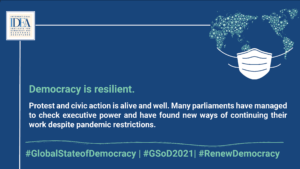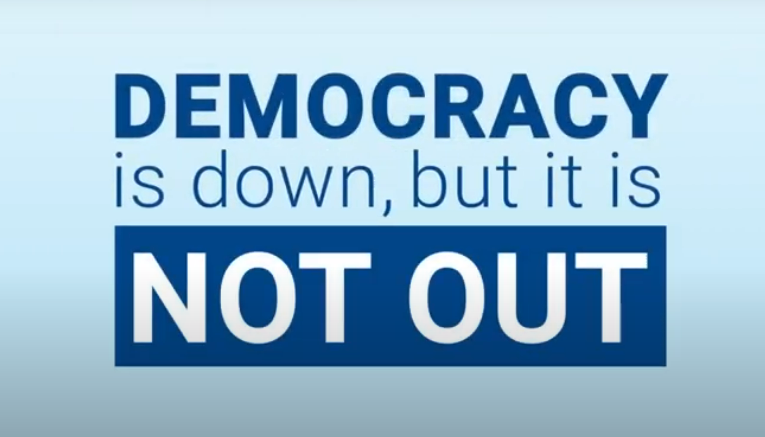For the fifth consecutive year, the number of countries moving in an authoritarian direction exceeds the number of countries moving towards democracy. But even if the long democratic recession is deepening worldwide there is a hopeful dawn that could create a domino effect of turning points for democracy, argues Birgitta Ohlsson, Director of Political Parties for the National Democratic Institute, a core institute of the National Endowment for Democracy (NED):
- Cross-party collaboration is back. To defend democracy, deal with climate change, and solve current and future pandemics, democratic political parties need to unite. …. But there are currently few global spaces for democratic party groups and networks to collaborate in a cross-ideological, transnational manner to contribute concretely towards building democratic solidarity. At the National Democratic Institute (NDI), we are creating these spaces.
 Protest and pro-democracy movements are actively tackling everything from climate change, human rights violations, and fighting misogyny and racial inequalities. Many of the activists are young. Many are women. Women make up 50 percent of the world’s population but women occupy the role of Heads of State or Government in only 22 countries. 50 percent of the world’s population are under 30, but only 2.6 percent of the total number of Members of Parliament globally are younger than 30. Bridging the gap, listening to and inviting more young people into politics would revitalize democracy….
Protest and pro-democracy movements are actively tackling everything from climate change, human rights violations, and fighting misogyny and racial inequalities. Many of the activists are young. Many are women. Women make up 50 percent of the world’s population but women occupy the role of Heads of State or Government in only 22 countries. 50 percent of the world’s population are under 30, but only 2.6 percent of the total number of Members of Parliament globally are younger than 30. Bridging the gap, listening to and inviting more young people into politics would revitalize democracy….- Democracy support in development aid has increased steadily since the mid-1990s. But we need more reforms. International democracy aid seems to be more successful historically at supporting democratization than preventing democratic backsliding. … President Joe Biden’s Democracy Summit is a great opportunity for democratic allies to unite. New promising values-based investments in people, parties and movements fighting for freedom are necessary to pave the way for democracy.
All these initiatives can build a foundation for a fourth wave of democratization, adds Ohlsson, a former Swedish EU- and democracy Minister (2010-2014) and Member of Parliament (2002-2018).
 An important pre-condition for democratic resilience is the state’s ability to respond to citizens’ needs. Learning from a pandemic that has affected the health and economic well-being of so many citizens, governments must renew their commitment to inclusive social development, says a recent report from a Global Commission convened by the Club de Madrid – Democracy and Emergencies: Lessons from the COVID-19 pandemic for democratic resilience. The Commission presents 20 recommendations for government leaders, public institutions and civil society:
An important pre-condition for democratic resilience is the state’s ability to respond to citizens’ needs. Learning from a pandemic that has affected the health and economic well-being of so many citizens, governments must renew their commitment to inclusive social development, says a recent report from a Global Commission convened by the Club de Madrid – Democracy and Emergencies: Lessons from the COVID-19 pandemic for democratic resilience. The Commission presents 20 recommendations for government leaders, public institutions and civil society:
- to strengthen democracies’ ability to keep their democratic institutions working in emergencies;
- to protect fundamental rights and the rule of law during emergency response;
- to deliver services, including emergency support services, inclusively to all citizens;
- and to respond to crises with the kind of leadership that preserves trust and gathers all of society around a shared commitment to democratic values and principles.
International IDEA’s The Global State of Democracy: Building resilience in a pandemic era” (above) offers policy recommendations to spark innovative thinking for policymakers, governments and civil society organizations.
The Sharp Power and Democratic Resilience series from the NED’s International Forum aims to contextualize the nature of sharp power, inventory key authoritarian efforts and domains, and illuminate ideas for non-governmental action essential to strengthening democratic resilience.








